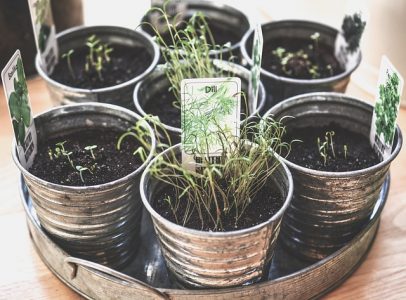Post contributed by Jonathan Lillebo, Graduate Student in Adult Education, Bachelor of Science in Horticulture ‘18, President, Organic Garden Club ’16-‘18
You are strolling through the market and as you pass the flower and plant section, you spot a sweet little row of succulents and decide you are going to go for it and create a lovely succulent table. You take your new little friends home, but much to your dismay, a week goes by and instead of being a master of eco interior design you are instead a serial plant murder. Or perhaps you decided to try your hand at growing your own veggies; you purchase all the seeds, build a darling little garden bed and plant each row ever so carefully. Yet, week after week, instead of a bountiful garden, you are still gazing at a patch of dirt. These are just a few examples of the experiences many people have shared with me over the years. Struggling with plants can be such a discouraging experience people often feel they simply do not have a “green thumb” and give up altogether. I, like many others, started out with a larger garden and quickly became confused and discouraged when my plants did not thrive the way that I expected. Jumping in with both feet can be a great way to start toward many goals, however, unless you are an experienced gardener or farmer it may be too much for many people and lead to a negative experience.
A great remedy for this could be taking your time and starting with a few (or just one) simple herbs. Things like peppermint or basil would be a great place to start, and you can begin to enjoy the flavors of your herb garden within a few short weeks. Adding some fresh basil leaves to a pizza or a sandwich, or some fresh mint to a cool beverage can be very rewarding! If you don’t know how to get started on your own, garden centers have started selling pots with a mix of herbs and the manager could recommend an organic fertilizer to keep your herbs looking beautiful.

If you are associated with Auburn University you are welcome to join the Organic Garden Club to learn more about sustainable gardening. The club meets every Monday from 4-6 at the Kreher Forest Ecology Preserve. Another place to find resources on getting started with a personal garden is your local Extension agent. They will know about community gardens or classes in the local area where you could start building your knowledge base while you grow a productive garden and lasting friendships. Learning about edible plants that are native to your area is beneficial as well. Great joy comes from discovering ripe muscadines while on a hike!
Soon you will have a few plants you have kept alive on your own and be able to enjoy the tasty fruits of your efforts! As your expertise grow (pun intended), you will be able to expand to more plants and further increase what you are contributing to your diet. Experiencing these small successes will boost your confidence and allow you to enjoy the process rather than struggling. Gardening should, after all, be a relaxing and enjoyable experience!
You don’t have to grow a large garden to contribute some home-grown flavors to your diet, or to reduce what you are purchasing in the grocery store. Starting with a few plants and learning about native edibles can make your life a little more sustainable, bring you joy, and add some nice flavors to your diet.




